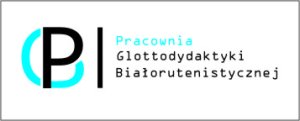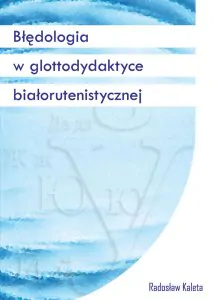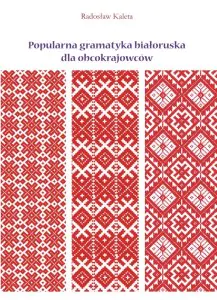About Laboratory
 Belarusian glottodidactics is experiencing a renaissance. It is also a subject of reflection at conferences, which is confirmed by the presence of a corresponding panel at the International Congress of Belarusian Studies in 2010 and 2015. The discussions in 2015 marked another impulse for the development of the aforementioned field in Poland and Belarus. Work is underway on creating certification programs for Belarusian as a foreign language (BFL), training BFL teachers, organizing summer schools of Belarusian studies, conferences, etc. The Department of Belarusian Studies at the University of Warsaw underwent similar work on the development of interdisciplinary glottodidactic research, and so the Department is involved in such initiatives and strongly supports them. Since 1 December 2015, the Laboratory of Belarusian Glottodidactics (LBG, or PGB in Polish) has been working formally.
Belarusian glottodidactics is experiencing a renaissance. It is also a subject of reflection at conferences, which is confirmed by the presence of a corresponding panel at the International Congress of Belarusian Studies in 2010 and 2015. The discussions in 2015 marked another impulse for the development of the aforementioned field in Poland and Belarus. Work is underway on creating certification programs for Belarusian as a foreign language (BFL), training BFL teachers, organizing summer schools of Belarusian studies, conferences, etc. The Department of Belarusian Studies at the University of Warsaw underwent similar work on the development of interdisciplinary glottodidactic research, and so the Department is involved in such initiatives and strongly supports them. Since 1 December 2015, the Laboratory of Belarusian Glottodidactics (LBG, or PGB in Polish) has been working formally.
The research team consists of: dr hab. Radosław Kaleta, prof. ucz. (Department of Belarusian Studies, Faculty of Applied Linguistics – head), dr hab. Andriej Moskwin, prof. ucz. (DBS FAL), dr. Volha Tratsiak (DBS FAL), dr. Mirosław Jankowiak (Czech Academy of Sciences), dr. Lidzija Siamieszka (Belarus, National Institute of Education), Associate Professor dr. Volha Barysienka (China, X’ian International Studies University), Associate Professor dr. Vieranika Bandarovich (Belarus, Institute of Modern Knowledge).
Here are some selected tasks that will be completed by the laboratory:
• developing interdisciplinary glottodidactic research;
• research of the linguistic aspect of teaching Belarusian as a foreign language (BFL);
• studying the influence of sociolinguistics and language policy on the teaching of BFL;
• developing research on cultural linguistics ( Belarusian studies, ethnolinguistics, local history studies) and intercultural communication;
• developing research on teaching Belarusian culture (the place of culture in the language teaching process; language etiquette; stereotypes in BFL teaching textbooks, taboo topics; idealization of textbook characters);
• developing research on comparative glottodidactics (e.g.Polish-Belarusian, Polish-Belarusian-Russian, Belarusian-Russian, Belarusian-German, etc .);
• analyzing and comparing teaching methods, course programs, the role of instructors;
• analyzing the issues of BFL certification (certificate levels, the program required for a given level, methods of preparing students to take certification examinations and test templates;
• preparing curricula for different language levels;
• development of sample materials, exercises, BFL lessons with the use of new technologies;
• analysis of the use of new technologies and literary texts (original or simplified) in classes in international and nationally uniform groups (Slavic and non-Slavic);
• research on BFL perception by foreigners;
• analysis of the Belarusian language of foreigners;
• analysis of linguistic errors and the study of the so-called interlanguage and pronunciation;
• study of the issues of the education and work of BFL teachers in Belarus and abroad;
• monitoring of the situation of BFL in different countries.
The Laboratory of Belarusian Glottodidactics, despite its formal membership within the structures of the Faculty of Applied Linguistics and the Department of Belarusian Studies of the University of Warsaw, is, however, open and broad: international and interdisciplinary. It cooperates with researchers from Belarus, Ukraine, Poland, China, UK, U.S.A. The results of its work will be made available in digital form using new technologies. All interested parties are invited join its efforts.
Address: Laboratory of Belarusian Glottodidactics, Department of Belarusian Studies, University of Warsaw, Dobra 55, 00-311 Warsaw, 2nd floor, room 2.615
Head of the LBG: dr hab. Radosław Kaleta, prof. ucz., rkaleta[at]uw.edu.pl
On May 13, 2021, the online conference “Belarusian glottodidactics: history, current state and perspectives. On the occasion of the 5th anniversary of the Belarusian Glottodidactics Laboratory” took place [program]. On April 7, 2025, the section “Belarusian glottodidactics: history, current state and perspectives. On the occasion of the 10th anniversary of the Belarusian Glottodidactics Laboratory” took place [see]. [agenda]
Our editions:
1) the journal “Belarusian Language as a Foreign Language” (see Archive);
2) the monograph Błędologia w glottodydaktyce białorutenistycznej, Warszawa 2018

book review: Kozłowska-Doda, J. (2021). Radosław Kaleta, Błędologia w glottodydaktyce białorutenistycznej, Pracownia Glottodydaktyki Białorutenistycznej. Katedra Białorutenistyki. Wydział Lingwistyki Stosowanej Uniwersytetu Warszawskiego, Warszawa 2018. Acta Polono-Ruthenica, 2 (XXVI), 195–200. https://doi.org/10.31648/apr.7038
3) Popular Belarusian Grammar for Foreigners written in Polish (Popularna gramatyka białoruska dla obcokrajowców, Warszawa 2021, ss. 106). For details call: 507-641-512

